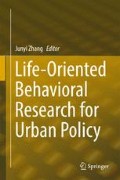Abstract
This chapter focuses on interdependent decisions on car ownership mobility, residential choice mobility, household structure mobility, and employment/education mobility over the life course. This study represents the above interdependencies based on a multilinear utility model and make an empirical study based on data from a web-based life history survey. Each of the four mobility domains is simply described as a set of episodes. Dependent variables in the model are the duration of each episode between two consecutive changes in each mobility domain. By using the multilinear utility functions, interepisode interactions within each mobility domain and interdomain interactions are simultaneously incorporated. The survey was conducted in 2010 and 1000 households provided valid data, and may well be the first life history survey with such a large sample size and comprehensive coverage in the transportation literature. Estimation results show a competitive relationship between the duration of episodes in the same domain, while a synergistic relationship between the duration of episodes in different domains exists. Furthermore, the biographical interactions in the life course are found to be substantial, contributing almost 95 % to total household utility, implying that mobility decisions are likely to be intertwined over the life course.
Access this chapter
Tax calculation will be finalised at checkout
Purchases are for personal use only
References
Beige S, Axhausen KW (2008) Long-term and mid-term mobility decisions during the life course: experiences with a retrospective survey. IATSS Res 32(2):16–33
Belli RF (1998) The structure of autobiographical memory and the event history calendar: potential improvements in the quality of retrospective reports in surveys. Memory 6(4):383–406
Belli RF, Smith LM, Andreski PM, Agrawal S (2007) Methodological comparisons between CATI event history calendar and standardized conventional questionnaire instruments. Public Opin Q 71(4):603–622
Ben-Akiva M, Lerman SR (1991) Discrete choice analysis: theory and application to travel demand. The MIT Press, Cambridge
Dargay J (2001) The effect of income on car ownership: evidence of asymmetry. Transp Res Part A 35:807–821
Dargay J, Hanly M (2007) Volatility of car ownership, commuting mode and time in the UK. Transp Res Part A 41(10):934–948
Dieleman F (2001) Modelling residential mobility: a review of recent trends in research. J Hous Built Environ 16:249–265
Dieleman FM, Mulder CH (2002) The geography of residential choice. In: Aragonés JI, Francescato G, Gärling T (eds) Residential environments: choice, satisfaction, and behavior. Bergin & Garvey, Westport, Connecticut, pp 35–54
Eliasson J, Mattsson L (2000) A model for integrated analysis of household location and travel choices. Transp Res Part A 34(5):375–394
Freedman D, Thornton A, Camburn D, Alwin D, Young-DeMarco L (1988) The life history calendar: a technique for collecting retrospective data. Sociol Methodol 18:37–68
Hollingworth BJ, Miller EJ (1996) Retrospective interviewing and its application in study of residential mobility. Transp Res Rec 1551:74–81
Kaiser B (2003) FRAME-Freizeitmobilität älterer Menschen. Paper presented at the annual meeting of the working group transportation of the German association of geographers, Wuppertal, 5–7 June
Lanzendorf M (2003) Mobility biographies: a new perspective for understanding travel behaviour. Paper presented at the 10th international conference on travel behaviour research, Lucerne, 10–15 Aug
Lanzendorf M (2010) Key events and their effect on mobility biographies: the case of child birth. Int J Sustain Transp 4(5):272–292
Mayer KU, Tuma NB (1990) Event history analysis in life course research. University of Wisconsin Press, Madison
Mohammadian A, Miller EJ (2003) Dynamic modeling of household automobile transactions. Transp Res Rec 1831:98–105
Novaco RW, Stokols D, Milanesi LC (1990) Subjective and objective dimensions of travel impedance as determinants of commuting stress. Am J Community Psychol 18:231–257
Ommeren JNV, Rietveld P, Nijkamp P (1999) Job mobility, residential mobility and commuting: a search perspective. J Urban Econ 46:230–253
Scheiner J (2006) Housing mobility and travel behaviour: a process-oriented approach to spatial mobility. evidence from a new research field in Germany. J Transp Geogr 14(4):287–298
Scheiner J (2007) Mobility biographies: elements of a biographical theory of travel demand. Erdkunde 61(2):161–173
Stutzer A, Frey B (2008) Stress that doesn’t pay: the commuting paradox. Scand J Econ 110(2):339–366
Van der Waerden P, Timmermans H, Borgers A (2003) The influence of key events and critical incidents on transport mode choice switching behaviour: a descriptive analysis. Paper presented at the 10th international conference on travel behaviour research (IATBR), Lucerne, 10–15 Aug
Van Ommeren J, Rietveld P, Nijkamp P (2000) Job mobility, residential mobility and commuting: A theoretical analysis using search theory. Ann Reg Sci 34:213–232
Waddell P (2001) Towards a behavioral integration of land use and transportation modeling. In: Hensher D (ed) Travel behavior research: the leading edge. Pergamon, New York, pp 65–95
Wissen LJG, Dykstra PA (1999) Population issues. An interdisciplinary focus. Kluwer Academic/Plenum Publishers, New York
Zhang J, Fujiwara A (2006) Representing household time allocation behavior by endogenously incorporating diverse intra-household interactions: a case study in the context of elderly couples. Transp Res Part B 40:54–74
Zhang J, Timmermans H, Borgers A (2002) A utility-maximizing model of household time use for independent, shared and allocated activities incorporating group decision mechanisms. Transp Res Rec 1807:1–8
Author information
Authors and Affiliations
Corresponding author
Editor information
Editors and Affiliations
Rights and permissions
Copyright information
© 2017 Springer Japan KK
About this chapter
Cite this chapter
Yu, B., Zhang, J. (2017). Biographical Interactions Over the Life Course: Car Ownership, Residential Choice, Household Structure, and Employment/Education. In: Zhang, J. (eds) Life-Oriented Behavioral Research for Urban Policy. Springer, Tokyo. https://doi.org/10.1007/978-4-431-56472-0_14
Download citation
DOI: https://doi.org/10.1007/978-4-431-56472-0_14
Published:
Publisher Name: Springer, Tokyo
Print ISBN: 978-4-431-56470-6
Online ISBN: 978-4-431-56472-0
eBook Packages: EnergyEnergy (R0)

